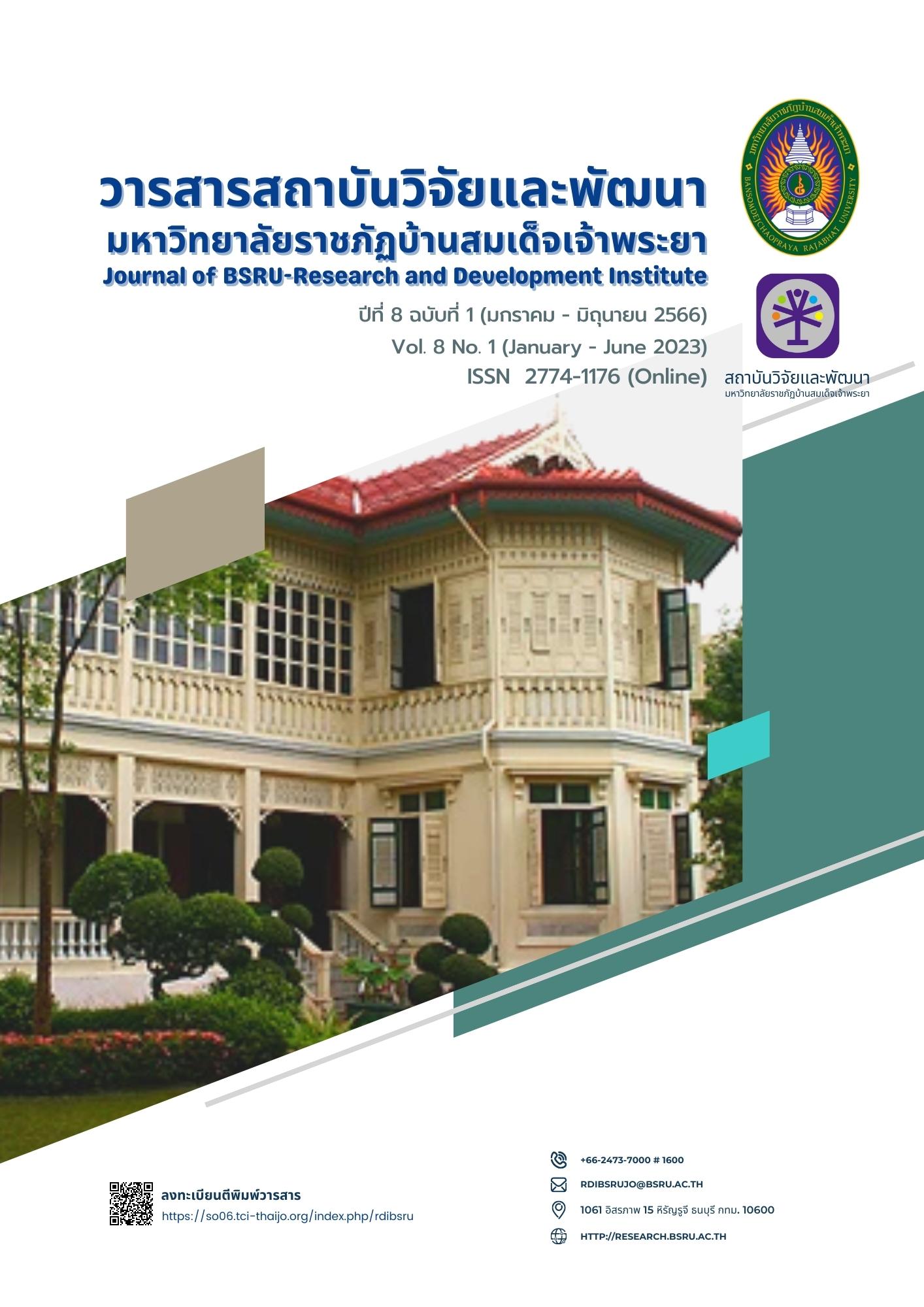ปัจจัยที่ส่งผลต่อการขาดแรงจูงใจทางวิชาการของนักเรียนชั้นมัธยมศึกษาปีที่ 3 โรงเรียนทุ่งศุขลาพิทยา “กรุงไทยอนุเคราะห์” อำเภอศรีราชา จังหวัดชลบุรี
คำสำคัญ:
ขาดแรงจูงใจทางวิชาการ, ผลสัมฤทธิ์ทางการเรียน, ความแปลกแยกในตนเอง, การสนับสนุนทางสังคมบทคัดย่อ
การวิจัยในครั้งนี้มีวัตถุประสงค์เพื่อศึกษาความสัมพันธ์ระหว่างตัวแปร และสร้างสมการถดถอยพหุคูณทำนายการขาดแรงจูงใจทางวิชาการของนักเรียนชั้นมัธยมศึกษาปีที่ 3 ปีการศึกษา 2565 โรงเรียนทุ่งศุขลาพิทยา “กรุงไทยอนุเคราะห์” ประชากรที่ใช้ในการวิจัยในครั้งนี้ คือ นักเรียนชั้นมัธยมศึกษาปีที่ 3 โรงเรียนทุ่งศุขลาพิทยา “กรุงไทยอนุเคราะห์” อำเภอศรีราชา จังหวัดชลบุรี มี 9 ห้องเรียน จำนวนนักเรียน ทั้งสิ้น 300 คน โดยเปิดตารางสำเร็จรูปของเครจซี่และมอร์แกน (Krejcie & Morgan, 1970) ได้กลุ่มตัวอย่าง จำนวน 169 คน วิเคราะห์ข้อมูลโดยใช้ค่าเฉลี่ย ส่วนเบี่ยงเบนมาตรฐาน ค่าสัมประสิทธิ์สหสัมพันธ์ และการวิเคราะห์การถดถอยเชิงพหุคูณ ผลการวิจัยพบว่า ความแปลกแยกในตนเอง (X2) มีความสัมพันธ์ทางบวก และผลสัมฤทธิ์ทางการเรียน (X1) และการสนับสนุนทางสังคม (X3) มีความสัมพันธ์ทางลบกับการขาดแรงจูงใจทางวิชาการของนักเรียนชั้นมัธยมศึกษา ปีที่ 3 อย่างมีนัยสำคัญทางสถิติที่ระดับ .01 ตัวแปรที่สามารถทำนายการขาดแรงจูงใจทางวิชาการของนักเรียนชั้นมัธยมศึกษาปีที่ 3 โรงเรียนทุ่งศุขลาพิทยา “กรุงไทยอนุเคราะห์” ได้อย่างมีนัยสำคัญทางสถิติที่ระดับ .01 ได้แก่ ผลสัมฤทธิ์ทางการเรียน และความแปลกแยกในตนเอง โดยสามารถร่วมกันทำนายการขาดแรงจูงใจทางวิชาการของนักเรียนชั้นมัธยมศึกษาปีที่ 3 ได้ร้อยละ 43 ซึ่งสามารถเขียนเป็นสมการพยากรณ์ ได้ดังนี้
สมการพยากรณ์ในรูปคะแนนดิบ
Y’ = 1.90 - .30(X1) + .55(X2)
สมการพยากรณ์ในรูปคะแนนมาตรฐาน
Z’y = - .27(ZX1) + .58(ZX2)
Downloads
เอกสารอ้างอิง
เขียน วันทนียตระกูล. (2557). แรงจูงใจมีความสำคัญต่อการเรียนการสอนอย่างไร. สืบค้นเมื่อ 15 มกราคม พ.ศ. 2566 จาก https://asksak2011.wordpress.com/2013/01/30/แรงจูงใจมีความสำคัญต่อ/.
สุรางค์ โค้วตระกูล. (2548). จิตวิทยาการศึกษา. กรุงเทพมหานคร: สำนักพิมพ์แห่งจุฬาลงกรณ์มหาวิทยาลัย.
ไพศาล แย้มวงษ์. (2555). การสนับสนุนทางสังคมที่ส่งผลต่อความพึงพอใจในชีวิตของนักศึกษามหาวิทยาลัยธรรมศาสตร์. [วิทยานิพนธ์ปริญญาโท, มหาวิทยาลัยศรีนครินทรวิโรฒ].
อุษณี บรรจงกิจ. (2553). การวิเคราะห์องค์ประกอบเชิงยืนยันการขาดแรงจูงใจทางวิชาการของนักเรียนชั้นมัธยมศึกษาตอนปลาย. วารสารวิทยาการวิจัยและวิทยาการปัญญา, 8(2), 86-102.
Ahmadi, A., Ziapour, A., Lebni, J. Y., & Mehedi, N. (2023). Prediction of academic motivation based on variables of personality traits, academic self-efficacy, academic alienation and social support in paramedical students. Community Health Equity Research & Policy, 43(2), 195-201.
Sivrikaya, A. H. (2019). The Relationship between Academic Motivation and Academic Achievement of the Students. Asian Journal of Education and Training, 5(2), 309-315.
Amrai, K., Motlagh, S. E., Zalani, H. A., & Parhon, H. (2011). The relationship between academic motivation and academic achievement students. Procedia-Social and Behavioral Sciences, 15, 399-402.
Boeree, C. G. (1980). Alienation and the Perception of Personality. Oklahoma State University.
Gupta, P. K., & Mili, R. (2017). Impact of academic motivation on academic achievement: A study on high schools students. European Journal of Education Studies.
Ilter, I. (2021). The relationship between academic amotivation and academic achievement: A study on middle school Students. Journal of Theoretical Educational Science, 14(3), 389-410.
Jiang, Y., Bong, M., & Kim, S. I. (2015). Conformity of Korean adolescents in their perceptions of social relationships and academic motivation. Learning and Individual Differences, 40, 41-54.
Kim, J., Christy, A. G., Schlegel, R. J., Donnellan, M. B., & Hicks, J. A. (2018). Existential ennui: Examining the reciprocal relationship between self-alienation and academic amotivation. Social Psychological and Personality Science, 9(7), 853-862.
Krejcie, R. V., & Morgan, D. W. (1970). Determining sample size for research activities. Educational and psychological measurement, 30(3), 607-610.
Legault, L., Green-Demers, I., & Pelletier, L. (2006). Why do high school students lack motivation in the classroom? Toward an understanding of academic amotivation and the role of social support. Journal of educational psychology, 98(3), 567.
Ryan, R. M., & Deci, E. L. (2002). Overview of self-determination theory: An organismic dialectical perspective. Handbook of self-determination research, 2, 3-33.
Smallwood, J., Fishman, D. J., & Schooler, J. W. (2007). Counting the cost of an absent mind: Mind wandering as an underrecognized influence on educational performance. Psychonomic bulletin & review, 14, 230-236.
Tezci, E., Sezer, F., Gurgan, U., & Aktan, S. (2015). A study on social support and motivation. The Anthropologist, 22(2), 284-292.
Vess, M., Leal, S. A., Hoeldtke, R. T., Schlegel, R. J., & Hicks, J. A. (2016). True self-alienation positively predicts reports of mindwandering. Consciousness and cognition, 45, 89-99.
Wigfield, A., & Wagner, A. L. (2005). Competence, motivation, and identity development during adolescence. Handbook of competence and motivation, 222-239. New York, NY: Guilford
ดาวน์โหลด
เผยแพร่แล้ว
ฉบับ
ประเภทบทความ
สัญญาอนุญาต
บทความ ข้อความ ภาพประกอบ และตารางประกอบที่ลงพิมพ์ในวารสารเป็นความคิดเห็นส่วนตัวของผู้นิพนธ์ กองบรรณาธิการไม่จำเป็นต้องเห็นตามเสมอไป และไม่มีส่วนรับผิดชอบใดๆ ถือเป็นความรับผิดชอบของผู้นิพนธ์เพียงผู้เดียว






